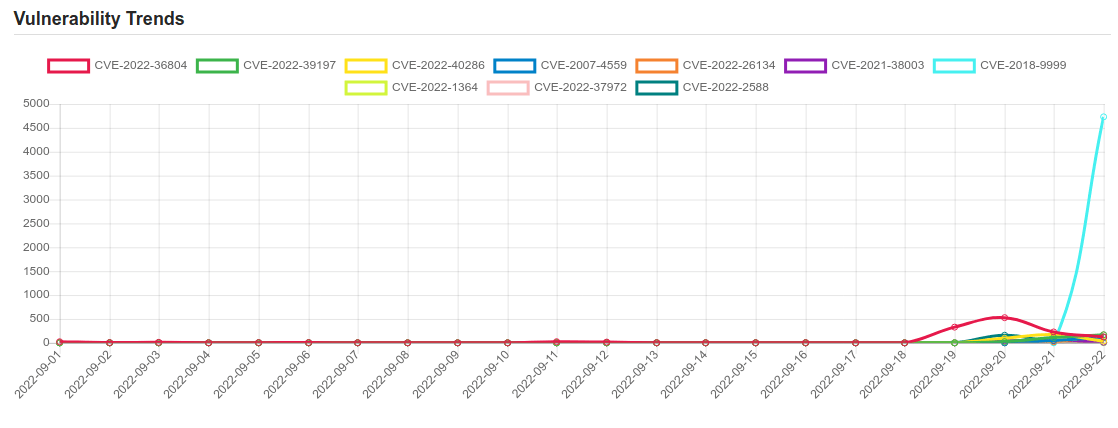Daily Vulnerability Trends: Fri Sep 23 2022

| CVE NAME | CVE Description |
| CVE-2022-2906 | An attacker can leverage this flaw to gradually erode available memory to the point where named crashes for lack of resources. Upon restart the attacker would have to begin again, but nevertheless there is the potential to deny service. |
| CVE-2022-38177 | By spoofing the target resolver with responses that have a malformed ECDSA signature, an attacker can trigger a small memory leak. It is possible to gradually erode available memory to the point where named crashes for lack of resources. |
| CVE-2022-34918 | An issue was discovered in the Linux kernel through 5.18.9. A type confusion bug in nft_set_elem_init (leading to a buffer overflow) could be used by a local attacker to escalate privileges, a different vulnerability than CVE-2022-32250. (The attacker can obtain root access, but must start with an unprivileged user namespace to obtain CAP_NET_ADMIN access.) This can be fixed in nft_setelem_parse_data in net/netfilter/nf_tables_api.c. |
| CVE-2022-38178 | By spoofing the target resolver with responses that have a malformed EdDSA signature, an attacker can trigger a small memory leak. It is possible to gradually erode available memory to the point where named crashes for lack of resources. |
| CVE-2022-2881 | The underlying bug might cause read past end of the buffer and either read memory it should not read, or crash the process. |
| CVE-2022-2795 | By flooding the target resolver with queries exploiting this flaw an attacker can significantly impair the resolver’s performance, effectively denying legitimate clients access to the DNS resolution service. |
| CVE-2022-27255 | In Realtek eCos RSDK 1.5.7p1 and MSDK 4.9.4p1, the SIP ALG function that rewrites SDP data has a stack-based buffer overflow. This allows an attacker to remotely execute code without authentication via a crafted SIP packet that contains malicious SDP data. |
| CVE-2022-24086 | Adobe Commerce versions 2.4.3-p1 (and earlier) and 2.3.7-p2 (and earlier) are affected by an improper input validation vulnerability during the checkout process. Exploitation of this issue does not require user interaction and could result in arbitrary code execution. |
| CVE-2022-34917 | A security vulnerability has been identified in Apache Kafka. It affects all releases since 2.8.0. The vulnerability allows malicious unauthenticated clients to allocate large amounts of memory on brokers. This can lead to brokers hitting OutOfMemoryException and causing denial of service. Example scenarios: – Kafka cluster without authentication: Any clients able to establish a network connection to a broker can trigger the issue. – Kafka cluster with SASL authentication: Any clients able to establish a network connection to a broker, without the need for valid SASL credentials, can trigger the issue. – Kafka cluster with TLS authentication: Only clients able to successfully authenticate via TLS can trigger the issue. We advise the users to upgrade the Kafka installations to one of the 3.2.3, 3.1.2, 3.0.2, 2.8.2 versions. |
| CVE-2022-36804 | Multiple API endpoints in Atlassian Bitbucket Server and Data Center 7.0.0 before version 7.6.17, from version 7.7.0 before version 7.17.10, from version 7.18.0 before version 7.21.4, from version 8.0.0 before version 8.0.3, from version 8.1.0 before version 8.1.3, and from version 8.2.0 before version 8.2.2, and from version 8.3.0 before 8.3.1 allows remote attackers with read permissions to a public or private Bitbucket repository to execute arbitrary code by sending a malicious HTTP request. This vulnerability was reported via our Bug Bounty Program by TheGrandPew. |
| CVE-2022-39197 | An XSS (Cross Site Scripting) vulnerability was found in HelpSystems Cobalt Strike through 4.7 that allowed a remote attacker to execute HTML on the Cobalt Strike teamserver. To exploit the vulnerability, one must first inspect a Cobalt Strike payload, and then modify the username field in the payload (or create a new payload with the extracted information and then modify that username field to be malformed). |
| CVE-2022-40286 | No description provided |
| CVE-2007-4559 | Directory traversal vulnerability in the (1) extract and (2) extractall functions in the tarfile module in Python allows user-assisted remote attackers to overwrite arbitrary files via a .. (dot dot) sequence in filenames in a TAR archive, a related issue to CVE-2001-1267. |
| CVE-2022-26134 | In affected versions of Confluence Server and Data Center, an OGNL injection vulnerability exists that would allow an unauthenticated attacker to execute arbitrary code on a Confluence Server or Data Center instance. The affected versions are from 1.3.0 before 7.4.17, from 7.13.0 before 7.13.7, from 7.14.0 before 7.14.3, from 7.15.0 before 7.15.2, from 7.16.0 before 7.16.4, from 7.17.0 before 7.17.4, and from 7.18.0 before 7.18.1. |
| CVE-2021-38003 | Inappropriate implementation in V8 in Google Chrome prior to 95.0.4638.69 allowed a remote attacker to potentially exploit heap corruption via a crafted HTML page. |
| CVE-2018-9999 | In Zulip Server versions before 1.7.2, there was an XSS issue with user uploads and the (default) LOCAL_UPLOADS_DIR storage backend. |
| CVE-2022-1364 | Type confusion in V8 Turbofan in Google Chrome prior to 100.0.4896.127 allowed a remote attacker to potentially exploit heap corruption via a crafted HTML page. |
| CVE-2022-37972 | Microsoft Endpoint Configuration Manager Spoofing Vulnerability. |
| CVE-2022-2588 | No description provided |
| CVE-2022-3080 | By sending specific queries to the resolver, an attacker can cause named to crash. |
A considerable amount of time and effort goes into maintaining this website, creating backend automation and creating new features and content for you to make actionable intelligence decisions. Everyone that supports the site helps enable new functionality.
If you like the site, please support us on Patreon using the button below

To keep up to date follow us on the below channels.






